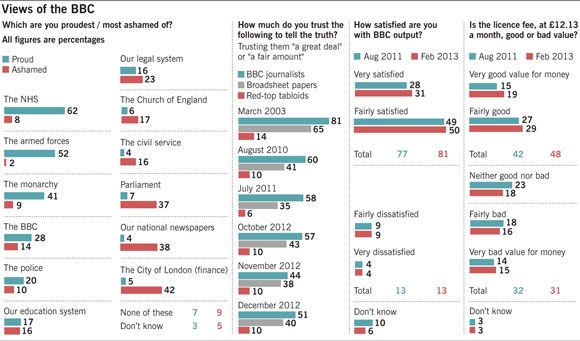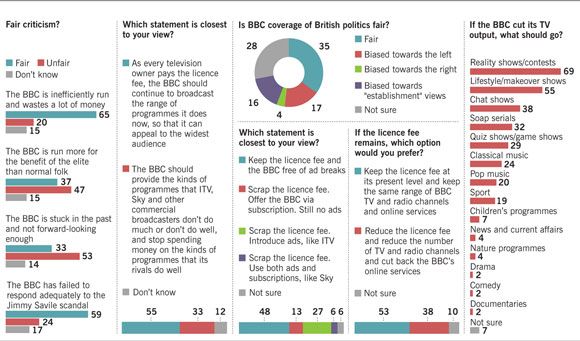The BBC’s new home: essential or a waste?
Open letter to Tony Hall
Dear Tony,
The waiting is almost over. For the past three months you have been contemplating what you will do as the BBC’s director general. When you walk through the gleaming doors of New Broadcasting House on 2nd April, you will have to start taking decisions. Plainly, your overarching challenge is to restore public trust. How? What is it about the BBC, after the turbulence of recent times, that most concerns viewers and listeners—and what is it that they cherish and which you disrupt at your peril? YouGov’s latest survey for Prospect has tried to find out.
The good news is that, compared with other pillars of national life, and other media outlets in particular, the BBC still rides high, even after the traumas induced by the Jimmy Savile crisis. It comes fourth out of a list of 12 British institutions in which we have pride—ahead of the police and our legal system and miles ahead of the civil service, parliament and our national newspapers. Only the National Health Service, our armed forces and the monarchy command more affection than the BBC.

To view a full sized version, click here
When asked how much they are trusted to tell the truth, BBC journalists, trusted by 51 per cent of people, outdo those writing for upmarket papers such as the Times, Telegraph and Guardian (40 per cent) and red-top tabloids, such as the Sun and Mirror (just 10 per cent). However, the BBC used to be trusted far more. In March 2003, the proportion was a remarkable 81 per cent. No British institution has tumbled further over the past 10 years. At the height of the Savile crisis three months ago, it was trusted by only 44 per cent, so it has recovered a little ground since then.
So should your target be to raise trust levels back to 81 per cent? I fear that if it is, you are doomed to fail. Trust in virtually every facet of public life has fallen in the past decade. We are generally a more sceptical nation. It’s unreasonable to suppose that the BBC can buck the trend on its own. To restore its relative position—compared, say, with judges, teachers and family doctors—a sensible ambition would be to raise trust levels back to 65-70 per cent.
A reputation for fairness is crucial. Again, our poll provides mixed news. Just 35 per cent regard the BBC’s coverage of British politics as fair. However, there is no consensus among the other 65 per cent about the direction of any bias. Indeed, a hefty 28 per cent say “don’t know.” This suggests that, for millions of viewers, the BBC’s problem is not so much the perception of a specific bias as a failure to demonstrate the positive virtues of objectivity. Among the 37 per cent who do think the BBC is biased, more regard it as leaning to the left (17 per cent) than the right (4 per cent). However, a significant minority—16 per cent—think the BBC is “biased towards ‘establishment’ views rather than left or right.”
The BBC has a specific problem with Conservative voters. More of them think it is biased to the left (34 per cent) than regard its coverage as fair (29 per cent). Do Labour voters display an equivalent concern for right-wing bias? No, actually. Forty-five per cent of Labour voters say the BBC’s coverage is fair; just 6 per cent of them blame it for displaying a bias to the right.
When we move away from BBC journalism to its wider role as national broadcaster, the news is better. We repeated a question we asked 18 months ago, well before the Savile scandal surfaced. Then, 77 per cent said they were “very” or “fairly” satisfied with the overall service provided by the BBC. Far from falling since then, as might be expected, the figure has actually risen. It now stands at 81 per cent. And the proportion regarding the BBC licence fee as good value for money is up from 42 per cent to 48 per cent—not a great figure but edging in the right direction from your point of view.
What about the future of the licence fee? The public is split down the middle over whether it should be kept (48 per cent) or replaced (46 per cent). Six out of 10 viewers whose household income is more than £40,000 want to keep the licence fee, compared with fewer than four in 10 whose income is less than £20,000. However, those against the licence fee divide three ways over what should replace it. The most popular alternative, especially among poorer households, is an advertising-funded service, like ITV and Channel Four, rather than subscriptions, or a mix of subscriptions and advertising, like Sky.
We all know that changing technology and the diversity of channels is impacting the licence fee debate. Overall, our figures suggest you have a good chance of winning the argument for keeping it, but you will need to work hard to win over those viewers, especially in poorer homes, who are unconvinced that the current system for financing the BBC is worth retaining.

To view a full sized version, click here
What does this mean in practice? Our poll provides five pointers:
• Persuade viewers that the BBC is becoming a lean, mean broadcasting machine. Two-thirds of the public agree with the criticism that “the BBC is inefficiently run and wastes a lot of money.”
• Show that the lessons from the Savile scandal have truly been learned. Six out of 10 people say the BBC has “failed to respond adequately” to the scandal.
• Bang the drum for continuing to provide the current full range of services. A narrow majority (55 per cent) backs this approach, while a sizeable minority thinks that “the BBC should concentrate on providing the kinds of programmes that ITV, Sky and other commercial broadcasters don’t do much or don’t do well, and stop spending money on the kinds of programmes that its rivals do well.” So you start ahead of the game—but the figures aren’t sufficiently overwhelming for you to declare it won.
• Nevertheless, if you feel that the BBC should withdraw from some programme-types, in order to defend quality broadcasting in its core services, then the top candidates for the chop should be reality, lifestyle and makeover shows. Many viewers also reckon that soaps, chat shows and game shows are overdone.
• Where the BBC scores are with news and current affairs, nature programmes, documentaries, drama and comedy. Very few people want these axed. True, they often attract smaller audiences than soaps and game shows, but their contribution to the BBC’s reputation, and to the case for maintaining the licence fee, cannot be judged by ratings alone.
Overall, you start out with a lot of public goodwill. Viewers like the range and quality of what the BBC does. The Savile scandal has dented but not shattered faith in the BBC. But the corporation has not escaped the general decline in trust in our national institutions and you need to strengthen the barricades with outstanding programmes made with tighter budgets and fewer managers if you are to continue to defend the licence fee successfully. Good luck!
Peter













